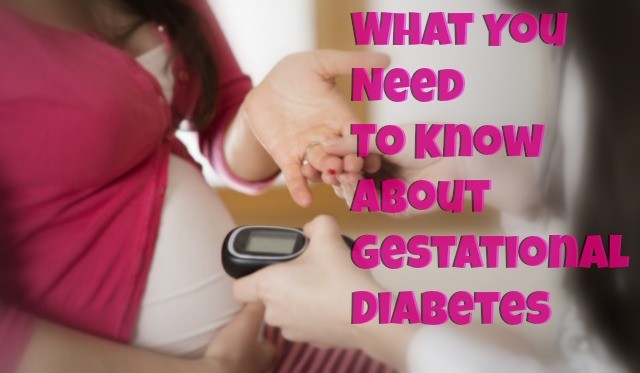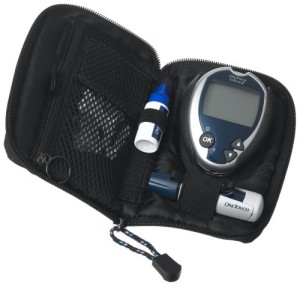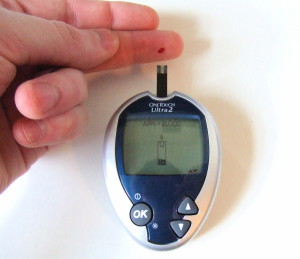When I was first diagnosed with Gestational Diabetes, at 26 weeks, I could not believe it. I kept trying to figure out what I did wrong and how this happened. I couldn’t understand how I ended up with Gestational Diabetes when I ate pretty healthy pre-pregnancy and throughout my pregnancy. I knew people who ate all junk and didn’t have it, so how did I?! Well, let me tell you, it’s not your fault! There is really nothing you can do to prevent it. You can try to lower your chances by eating healthy and exercising, but that is still not a guarantee.
What is Gestational Diabetes (GD)?
Gestational diabetes is one of the most common health problems in pregnancy. It basically means you have abnormally high levels of sugar in your blood. Gestational diabetes starts when your body is not able to make and use all of the insulin it needs for pregnancy. When you’re pregnant, hormonal changes can make your cells less responsive to insulin. Hormones from the placenta help the baby develop, but these hormones also block the action of the mother’s insulin in her body. This makes it hard for your body to use insulin. Without enough insulin, glucose cannot leave the blood and be changed to energy. Glucose builds up in the blood to high levels, resulting in gestational diabetes.
Most of the time, GD will go away once your baby is born. However, once you have had it, you are at a higher risk for having it again in future pregnancies and for developing diabetes later in life.
Testing for Gestational Diabetes:
At around 24 weeks you will take a one hour glucose screening test. My OB let me take the glucose drink home after my 20 week appointment, and I had to drink it an hour before my 24 week appointment. (I found that the fruit punch glucose drink tasted a lot like Kool-Aid.) Exactly an hour after you drank the glucose drink, they will draw your blood and then call you in a few days with the results. If you pass this first test, you’re done.
If you fail the one hour test, you then have to take the 3 hour test (Glucose Tolerance Test). The 3 hour test requires you to have your blood taken after fasting, so your appointment will be first thing in the morning. Then they will draw your blood three more times times (once every hour) after drinking the glucose solution. This drink is much sweeter than the first. You have to sit and wait in the waiting room for these 3 hours and cannot eat anything.
If you throw it up, like I did, you have to stop and come back to retake the test. The other option is to ask your OB if you can just track your blood sugar instead, so that you do not have to retake the 3 hour test. However, tracking your blood sugar on your own will require you to prick your finger four times a day for at least two weeks.
Controlling Gestational Diabetes:
Blood Sugar: If you are diagnosed with Gestational Diabetes, you will need to check your blood sugar levels four times a day with a home glucose meter or strips. My OB had me test it first thing in the morning (fasting), two hours post breakfast, two hours post lunch, and two hours post dinner. Some doctors may have you do it an hour post meals, so it really depends on you and your doctor.
Diet: To control your GD you will need to eat a well planned diet. You may need to meet with a dietitian for help with this. Your diet will need the correct balance of protein, fats, and carbs. You will not want to skip meals because this can negatively impact your blood sugar levels. Also, you will want to avoid any sugary items like candy, cereal, cake, soda, cookies, etc. I have found that even things like bananas and orange juice can cause a spike in your blood sugar levels. Apples are a good fruit to help control GD.
Exercise: Exercising helps improve your body’s ability to process glucose and keep your blood sugar levels under control. A 30 minute walk, every day, can really help with this. Exercise is great for pregnancy in general, anyway (assuming you are not having other issues).
Medication: If diet and exercise are not working for you and you are unable to control your blood sugar, your doctor will prescribe medication. Luckily, there are oral medications to help control GD now.
At the end of the day, most of the things that help control GD are good for you and it is good to get in the habit of exercising and eating healthy. I decided to look on the bright side of having GD and focused on it being a way to help me control my weight gain.
Risks of Gestational Diabetes:
Most women who have GD deliver healthy babies, however, if you do not control your GD it can cause some problems.
1) Excessive birth weight: Your baby can grow too large, which can cause him to become wedged in the bath canal, sustain birth injuries, or require a C-section.
2) Low blood sugar: Your baby can develop low blood sugar right after birth because their insulin production is high. They may need to give the baby a glucose solution to return his blood sugar level back to normal.
3) Obesity and type 2 diabetes: Babies of mothers who have GD are at a higher risk of developing type 2 diabetes and becoming obese later in life.
4) High blood pressure and preeclampsia: GD raises your risk of high blood pressure and preeclampsia. Preeclampsia is very serious and can threaten the lives of both the mother and baby.
Pregnancy with Gestational Diabetes:
Again, this is something that varies from person to person. It really depends on how severe your GD is, how you are controlling it, and what your doctor decides. I will go over what my pregnancy was like with GD.
-NST’s: Starting at 32 weeks, I had to have a non-stress test every week. I have heard of other ladies having two every week and others not needing any at all.
-Tracking blood sugar: I had to track my blood sugar four times a day, as I mentioned above.
-Growth scan in third trimester: I had to have a growth scan at 36 weeks to see how the baby was measuring and if he was getting really big. This also helps your doctor determine if you will need to be induced or if you will need a C-section.
-Induction at 39 weeks: Some women who have GD are induced at 39 weeks. This is more likely if you are medication to control the GD or if your baby is measuring big at the growth scan.
Gestational Diabetes can be a scary thought and I definitely know the feeling. However, if you control it well, there is not too much to worry about. Just make sure you eat well and exercise. Also make sure you ask your doctor any and all questions!









